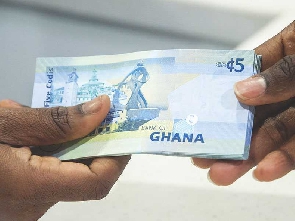 Already in January 2020, the cedi firmed up against its major trading currency by about 3.9 percent
Already in January 2020, the cedi firmed up against its major trading currency by about 3.9 percent
The sentiments of businesses in Ghana, as measured by the index derived from the Bank of Ghana’s (BoG) latest Business Confidence Survey, has depicted a slight decline in the confidence of their owners and managers as to the prospects of their businesses going forward.
The latest survey, conducted in December 2019 depicts that confidence has declined from a baseline level of 100 percent, to 96.6 percent in December 2019 compared to 97.3 percent recorded at the end of 2018.
The Governor of the central bank has explained that the marginal decline in confidence of the business sector has been on account of the exchange rate depreciation as at November 2019. As at November 2019, the cedi had depreciated against the dollar during the year by 12.8 percent, eventually closing the year with depreciation 12.9 percent for the whole of 2019.
Nevertheless, businesses expressed positive sentiments about industry prospects and declining interest rates.
Already in January 2020, the cedi firmed up against its major trading currency by about 3.9 percent. The US$ 3 billion Eurobond issuance will further boost the country’s external reserves to a new record high of well over US$10 billion, and the yet to be issued initial public offer (IPO) of US$ 750 million for the minerals development fund next month will further improve Ghana’s cache of foreign exchange and consequent strength of the cedi.
In view of this, the central bank since the start of the last quarter of 2019, began its forward forex auctions, which has significantly minimized the front-loading of foreign exchange demand on the market and, thus, has reduced the pressure on the spot market, reduced uncertainty as to the future availability of FX to meet the needs of commercial banks clients and deepened the foreign exchange market.
Sentiments of the business sector dampened during the second survey conducted last year, in June 2019 with the BoG’s business confidence index falling to 94.1 percent from 94.3 percent in April 2019. However, it made a recovery in August 2019, rising to 98.1 percent and further by October to 99.6 percent.
This economic indicator measures the amount of optimism or pessimism that business managers have about the prospects of their companies, as well as providing an overview of the state of the economy.
Consumer Confidence
Results from the BoG’s latest confidence surveys also showed significant recovery in consumer confidence during the last two months of 2019, reflecting a rebound in optimism among households about current and future economic conditions. At the end of the 2019, the consumer confidence index had improved to 98.8 percent compared to 98.3 percent in the same period of 2018. But consumer confidence had declined for much of the second half of last year, after peaking mid-year.
Sentiments of consumers improved during last year’s second survey period in June 2019 with the index at 99.2 percent, up from 96.6 percent in April 2019. However, it dampened in August 2019 to 96.0 percent and further declined in October to 95.6 percent.
Composite Index
Similar to trends in GDP growth, the Bank of Ghana’s updated Composite Index of Economic Activity (CIEA) recorded high growth, although at a slower pace than in 2018.
The CIEA recorded 3.1 percent year-on-year growth in November 2019, compared with 4.8 percent in the same period of 2018. This was mainly supported by port activity, domestic VAT, and Deposit Money Banks’ (DMBs) credit to the private sector.